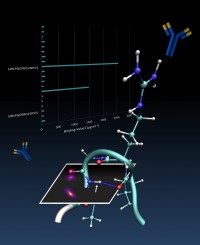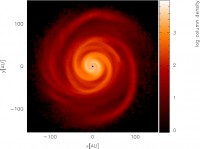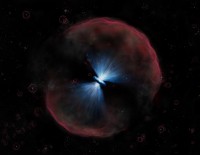
The Euclid mission, which aims to understand the origin of the accelerating expansion of the Universe, has been selected by the European Space Agency's (ESA) Cosmic Vision Programme.
The Euclid satellite will observe 1.5 billion galaxies in an effort to track the effects of dark energy, dark matter and gravity on the expansion and growth of cosmic structures in the Universe over the last 10 billion years. At the heart of Euclid is a massive optical digital camera - one of the largest such cameras put into space. Every 15 minutes it will produce an image that is the equivalent of nearly 300 HDTV screens, and in six years it will have surveyed 75 per cent of the sky. ESA plans to launch the Euclid satellite in 2019.
"Euclid is a wonderful step for European and UK science," Professor Andrew Taylor
Euclid and the Institute for Astronomy
The School's Institute for Astronomy (IFA) is heavily involved in several aspects of the mission, with the UK Euclid Science Data Centre to be based at the Royal Observatory (ROE), and run by the IFA’s Wide Field Astronomy Unit.
Professor Andrew Taylor, Professor of Astrophysics at the University's Institute for Astronomy, leads the UK Ground Segment for Euclid, responsible for coordinating the UK’s Euclid data analysis. He also leads the measurement of the Weak Gravitational Lensing signal – one of Euclid's two main science probes which will map the dark matter and probe dark energy – which will also be carried out in Edinburgh. "Euclid is a wonderful step for European and UK Science," said Professor Taylor. "Dark energy and dark matter are two of the biggest problems in Cosmology and Physics today, and Euclid will bring us much closer to explaining them. Edinburgh has a big part to play in this."
Thomas Kitching, a Royal Society Research Fellow at the IFA, is one of four European leads of the Euclid Science Group (a team of over 800 scientists) and co-leads the Weak Lensing science group. He said: "Euclid will image the sky with the same quality and depth as the hugely successful Hubble Space Telescope but over an area of sky thousands of times larger, producing so many images that it would take a million USB sticks to store the information."
"By imaging the majority of galaxies in our observable Universe, Euclid will unveil the mysteries of dark energy and gravity, revolutionising physics for decades to come." Thomas Kitching, IFA
About Euclid
Euclid is designed to understand the origin of Universe's accelerating expansion that physicists and astronomers refer to as "Dark Energy". Current observations show that dark energy comprises more than 70% of the matter-energy of the present-day Universe and is therefore driving its evolution.
To achieve this, it is proposed to build a satellite equipped with a 1.2 m telescope and three imaging and spectroscopic instruments working in the visible and near-infrared wavelength domains. These instruments will observe several hundreds of million galaxies over a large fraction of sky and will track the observational signatures of dark energy, dark matter and gravity on the geometry of the Universe and the cosmic history of structure formation. By measuring the apparent shapes and the distribution of galaxies in the Universe, astronomers will then derive what is dark energy and whether the general theory of relativity is still a valid gravitation theory on scales beyond billions of light years.
Euclid is planned for launch in 2019, with ESA funding the spacecraft, launch and operations. The UK and other national partners (Austria, Denmark, Italy, Finland, France, Germany, Netherlands, Norway, Romania, Spain, Switzerland) will fund the scientific instruments and the ground segment activities.
Nine UK institutions are involved in Euclid’s instrument development or data/processing/analysis activities: University College London; University of Durham; the Institute for Astronomy in Edinburgh; UK ATC; University of Oxford; University of Portsmouth; University of Hertfordshire; the Open University and the University of Cambridge.
In addition, many scientists across the UK are involved in the scientific definition of Euclid and will have access to the data. Across Europe, the Euclid consortium contains over 800 scientists from 110 institutions.
Image gallery
The SOUND exhibition combines soundscapes and artwork to examine how we are affected by industrial and urban noise. It has toured in the UK, India and Belarus and is currently installed in the Briggait Centre in Glasgow, where it was visited by over 1,000 people in the opening weekend.
The exhibition features a new semi-anechoic installation with surround sound and a binaural soundscape to reproduce the experience of hearing 'live' sounds. There is also a new video about sound made in the School of Physics and Astronomy.
'SOUND in a Man-Made Environment' is funded through the School of Physics and Astronomy by the Engineering and Physical Sciences Research Council. The Glasgow exhibition runs until October 10th.
More details about the exhibition and a list of the venues where it has been shown can be found on the SOUND website - see below.
Image gallery
Four academics in the School of Physics & Astronomy are among the first members of the Royal Society of Edinburgh's new Young Academy of Scotland.
Rosalind Allen, Cait MacPhee, Job Thijssen (all from the Institute for Condensed Matter and Complex Systems) and Catherine Heymans (Institute for Astronomy) will join 64 other academics, entrepreneurs, artists and professionals in the first venture of its kind in the UK.
The Young Academy brings together some of the most able people in Scotland, with the intention of stimulating creative ideas and collaborative working. It will also provide a forum for its members to engage with talented individuals beyond their own discipline or profession.
"I'm delighted to have been chosen as one of the first members of the Young Academy. Its ambitious goals will address many of the challenges facing society today and I'm very much looking forward to contributing to its work." Catherine Heymans.
"The Academy will support young academics in Scotland as well as reaching out beyond academia. It's great that the School is so well represented and I'm excited to be involved." Rosalind Allen.
"The Young Academy of Scotland will provide a unique platform for tackling complex issues which require an interdisciplinary effort, for example the energy challenge and climate change. I am very much looking forward to the new collaborations that it will encourage and to becoming more active in science policy and public engagement." Job Thijssen
The RSE Young Academy invited applications from outstanding young academics and professionals whose ages range from late 20s to early 40s. A wide variety of expertise is represented by its members, from biologists, geoscientists and engineers to lawyers, social scientists and entrepreneurs.
The Academy's members come from all parts of Scotland, and every year a new round of applications will be encouraged, bringing in a new cohort of members. Membership lasts for 3 years and can be continued for a further 3 years. In the first cohort, 68 people have been selected from 336 applicants. Of these over 40 % are female. About 80% are drawn from academic institutions, with around 20% from the professions and business.
The Young Academy of Scotland will be launched at a ceremony in Edinburgh in November.
Image gallery
Computer chips developed for gaming have the potential to create more realistic synthesised music.
Graphical Processor Units (GPUs) can be used to create more realistic synthesised music than has previously been possible. This is what Chris Maynard, a computer scientist at EPCC, claims will move along sound synthesis techniques, which have remained stagnant for decades.
Read the full article in ISGTW.

The Software Sustainability Institute (SSI) is a national facility for the users and developers of research software. It is led by EPCC in collaboration with the universities of Manchester and Southampton.
The SSI is on the lookout for researchers who use software in their work and who have a good understanding of current developments in their discipline. The Institute will pay researchers from any field up to £3000 a year to attend conferences and report on the latest developments.
Closing date: 8 August 2011
The Software Sustainability Institute is funded by the research councils to help researchers use and develop software for their research. To better understand the fields that most need our help, the institute are setting up a network of Agents. Working as an Agent, you will receive travelling expenses in return for a short report about the conference you attended, the people you met and your views on the topics that look most promising in the future.
Benefits
• Up to £3000 a year to attend the conferences and events that you want to attend
• Your advocacy will ensure that your field benefits from the best support for software development
• Add world-leading researchers to your professional network
• Free attendance at training events for new tools and technologies
• If you develop, improve your knowledge of effective techniques for developing sustainable software
• A great addition to your CV
Eligibility
You don’t have to be a professor or a Principal Investigator. We are looking for UK-based researchers with a good knowledge of their field, who are keen to travel and to meet new people, and have experience of national and international collaborations. We are looking for applicants from all disciplines and especially from the fields that have been flagged as strategically important to UK research: the ageing population, environment and climate change, the digital economy, energy and food security.
After a three-month trial period, Agents will be recruited for an initial term of one year, which is renewable each year. We expect to recruit around ten Agents every year.
By becoming an SSI Agent, you will attend more of the conferences that you want to attend, meet influential researchers from across all disciplines and ensure that your field receives the best support for software development.
Find out more
If you’re interested, or you’d like to nominate someone, please visit www.software.ac.uk/agents. If you would like more information, email Agents [at] software.ac.uk.
EPCC and SSI
EPCC provides specialist software engineering expertise to drive the continued
improvement and impact of research software through a series of projects in partnership with key research groups in the UK. EPCC staff work on impact projects with these groups to improve the maintenance, quality and usability of existing software, as well as developing publicly available tools and disseminating best practice to improve the process of sustainable software development.
Image gallery

A joint project to investigate new ways of detecting certain cancers has published its research in The Journal of Biological Chemistry, a highly rated interdisciplinary journal in the field of biochemistry and molecular biology.
Two hormones critical in the early stages of pregnancy - hCG and LH - were investigated by a team drawn from the School's Institute for Condensed Matter & Complex Systems, the UK's National Physical Laboratory (NPL), IBM T.J. Watson Research Center in New York and UK-based company Mologic Ltd.
Commercial pregnancy tests screen for the presence of hCG, but although its role as a tumour marker in a variety of cancers is of great clinical significance, it is not well understood. Before diagnostic tests based on hCG can be developed, it is necessary to first find a way of detecting its various forms while also distinguishing it from other closely related hormones.
The research team found that a particular antibody can discriminate between fragments of hCG and similar hormones that differ only by a single amino acid - this recognition process is analogous to a lock and key, where only one combination of antibody and hormone is possible. The structures of the hormone fragments were determined through a combination of computational simulations and spectroscopic measurements.
The team hopes that this research will lead to pharmaceutical companies developing new technologies for the early detection of certain cancers.
"The scientific conclusions are, we believe, widely applicable to peptide-antibody interactions in general, and also illuminate the strategy that should be followed in exploring such bio-molecular phenomena underpinning high-value commercial diagnostic products." Mologic's Chief Scientific Officer, Paul J Davis.
For further information about this work, see the article 'Antibody recognition of a human chorionic gonadotropin epitope (hCGβ66-80) depends on local structure retained in the free peptide' in the Journal of Biological Chemistry.
Image gallery

Dr Duncan Forgan of the Institute for Astronomy has been recognised with an award from the prestigious Royal Astronomical Society.
Dr Duncan Forgan’s thesis - 'Probing Self-Gravitating Discs Using Smoothed Particle Hydrodynamics with Radiative Transfer' - is this year’s winner of the RAS Michael Penston prize.
The prize is awarded for the best doctoral thesis in Astronomy or Astrophysics, and is open to all students registered at UK universities (excluding those focusing on planetary science, for which a separate prize is available.) As well as a monetary prize, the award includes the opportunity to give a short presentation on the thesis to an Ordinary Meeting of the Society.
Image gallery
The School's first Masters-level distance learning courses are to be established by staff in the Physics Education Research Group. The courses, in Research-Informed Science Education, will be aimed at a global audience of secondary school teachers in Physics and Chemistry, with the first intake in September 2012.
The two new courses will focus on research-based instructional strategies and technology-enhanced learning. Students will also be able to take additional courses from existing programmes in the School of Education as part of a Postgraduate Certificate.
DEI funding has also been secured to support other funded distance learning programmes across the College of Science and Engineering, and those being developed for future funding submissions.
This funding will establish the first distance learning courses within the School - indeed within the College of Science and Engineering. It's a completely different way of teaching and of learning. Prof. Simon Bates, Dean of Learning and Teaching.

An international team of astronomers announced today the discovery of the most distant known supermassive black hole, seen as a luminous quasar caused by gas falling into the black hole.
The discovery came to light using data from an ongoing infrared sky survey being conducted at the United Kingdom Infrared Telescope (UKIRT) - led by a team at Edinburgh - and confirmed by observations by the Gemini North telescope, both on Mauna Kea in Hawai'i. The results are presented in the June 30, 2011 issue of the Journal Nature.
Professor Andy Lawrence, Regius Professor of Astronomy at the University of Edinburgh, is the leader of the UKIRT Infrared Deep Sky Survey (UKIDSS). He explains: "The object was found in the UKIDSS maps by looking for rare objects that are bright in the infra-red but essentially invisible in ordinary light. This discovery is exciting in several ways. It breaks a world record by substantial amount. It tells us more about how stars and galaxies formed. But its also very gratifying because ten years ago I proposed this massive infrared survey, with finding a redshift seven quasar as one of its key goals – and we finally got there! However its also puzzling because the black hole inside the quasar is so massive. How did it grow so big so fast?"
"We expect to find a handful more such objects once we've finished the whole survey. But we also want to do an even bigger survey with the UKIRT telescope, which will give us a chance to find even more distant objects." Prof. Lawrence
The light from the quasar started its journey toward us when the Universe was only 6% of its present age, a mere 770 million years after the Big Bang, at a redshift of about 7.1.
"This gives astronomers a headache," says lead author Daniel Mortlock, Imperial College London. "It's difficult to understand how a black hole a billion times more massive than the Sun can have grown so early in the history of the Universe."
However, as well as being a headache, the new quasar is a great opportunity, because it allows scientists to measure the conditions in the gas that the quasar's light passes through on its way to us. "What is particularly important about this source is how bright it is," says Mortlock. "It's hundreds of times brighter than anything else yet discovered at such a great distance. This means that we can use it to tell us for the first time what conditions were like in the early Universe."
Cosmologists are extremely keen to measure the state of gas in the early Universe, to understand the process of how stars and galaxies formed. Most of the gas in the Universe is hydrogen, and most of it is ionized, meaning the electrons have been stripped off the protons. As one looks further away and thus further back in time, one should eventually reach the time when the gas was neutral - with the electrons and protons combined as atoms - before most of the stars in the Universe formed over 12 billion years ago. The transition between these periods is the epoch of reionization, a milestone in cosmic history. The light from the new quasar displays the characteristic signature of neutral gas. This signature, showing the quasar is beyond the epoch of reionization, was predicted in 1998 but has never been observed before.
"Being able to analyse matter at this critical juncture in the history of the Universe is something we've been long striving for but never quite achieved. Now it looks like we have crossed the barrier." Prof. Steve Warren, leader of the quasar team.
The quasar, named ULAS J1120+0641, was discovered in the UKIRT Infrared Deep Sky Survey (UKIDSS), a new map of the sky at infrared wavelengths. Such very distant, highly redshifted objects are much more easily found in infrared light. "It was for just this sort of discovery that we began this ambitious survey in 2005," said Prof. Gary Davis, Director of UKIRT. To find the quasar the team sifted through images of over 10 million sources. "We'd been searching for five years, and hadn't found anything, and were beginning to lose heart," said Warren. "It gave us a terrific jolt when we found it as we hadn't really expected to discover anything quite so far away."
To confirm that the object was really a distant quasar and to measure its distance, in December 2010 the team made further observations with the 8-meter Gemini North telescope, UKIRT's neighbor on Mauna Kea, using the Gemini Near-Infrared Spectrograph (GNIRS). "The timing was perfect..." recalled Kathy Roth, an astronomer at Gemini Observatory, "...as we got the observation request just days after the spectrograph had been made available for science use at Gemini North. Once the measurements were made it became immediately obvious they had found what they were looking for." The team then quickly collected an additional set of detailed observations, with telescopes at the European Southern Observatory (ESO), and in the Canary Islands. Collectively, these observations from many facilities allowed a detailed study of the properties of the quasar itself, and of the surrounding gas.
The team plans further detailed observations of ULAS J1120+0641, but also hope to find more such distant but bright quasars. Prof. Lawrence says: "We expect to find a handful more such objects once we've finished the whole survey. But we also want to do an even bigger survey with the UKIRT telescope, which will give us a chance to find even more distant objects."
UKIDSS data
Students at the University can base projects on the UKIDSS data, which is freely accessible through the data archive at the Royal Observatory. See link below.
NOTES
[1] Quasars are the most luminous objects known. They are thought to be the result of gas in a swirling disk accreting onto a supermassive black hole sitting at the center of a distant galaxy. As the gas falls in it gets extremely hot and emits radiation. The black hole slowly grows as it "swallows" more gas. At 770 million years after the Big Bang, there is barely enough time for a black hole to grow to two billion solar masses even if it is swallowing gas at the maximum possible (theoretical) rate.
[2] Details of the discovery are published in a paper in Nature on June 30th, entitled 'A luminous quasar at a redshift of z=7.085' by D.J. Mortlock, S. J. Warren, B. P. Venemans, M. Patel, P. C. Hewett, R. G. McMahon, C. Simpson et al.
[3] The UKIRT Infrared Deep Sky Survey [UKIDSS] is a project to map a large area of sky in infrared light, to much fainter light levels than attempted before. The new quasar ULAS J1120+0641 comes from a component called the "Large Area Survey (LAS)." The prefix J and the numbers refer to the quasar's position on the sky. The survey uses a very large infrared camera called Wide Field Camera (WFCAM) which was built at the Astronomy Technology Center (ATC) at the Royal Observatory Edinburgh. The observations are made at the United Kingdom Infrared Telescope (UKIRT) on the summit area of Mauna Kea in Hawai'i. Both the ATC and UKIRT are establishments of the UK's Science and Technology Facilities Council (STFC).
[4] Light from distant parts of the Universe is stretched out or "redshifted" by the expansion of the Universe. This means that light which starts at the quasar as ultraviolet and visible light arrives at Earth as infrared light. The light from ULAS J1120+0641 is stretched by a factor of 7.1. Because light travels at a finite speed, the light we see now from ULAS J1120+0641 started out about 12.9 billion years ago. The Universe is currently thought to be about 13.7 billion years old, so we see ULAS J1120+0641 as it was 0.8 billion years after the Universe began, or 770 million years.
About the United Kingdom Infrared Telescope (UKIRT)
One of the world's largest telescopes dedicated solely to infrared astronomy, the 3.8-metre (12.5-foot) United Kingdom Infrared Telescope (UKIRT) is sited near the summit of Mauna Kea, Hawaii, at an altitude of 4194 metres (13760 feet) above sea level. It is operated by the Joint Astronomy Centre in Hilo, Hawaii, on behalf of the UK Science and Technology Facilities Council. UKIRT's technical innovation and privileged position on the high, dry Mauna Kea site have placed it at the forefront of infrared astronomy since its opening in 1979.
About the Gemini Observatory
The Gemini Observatory is an international collaboration with two identical 8-meter telescopes. The Frederick C. Gillett Gemini Telescope is located on Mauna Kea, Hawai'i (Gemini North) and the other telescope on Cerro Pachón in central Chile (Gemini South); together the twin telescopes provide full coverage over both hemispheres of the sky. The telescopes incorporate technologies that allow large, relatively thin mirrors, under active control, to collect and focus both visible and infrared radiation from space.
The Gemini Observatory provides the astronomical communities in seven partner countries with state-of-the-art astronomical facilities that allocate observing time in proportion to each country's contribution. In addition to financial support, each country also contributes significant scientific and technical resources. The national research agencies that form the Gemini partnership include: the US National Science Foundation (NSF), the UK Science and Technology Facilities Council (STFC), the Canadian National Research Council (NRC), the Chilean Comisión Nacional de Investigación Cientifica y Tecnológica (CONICYT), the Australian Research Council (ARC), the Argentinean Consejo Nacional de Investigaciones Científicas y Técnicas (CONICET) and the Brazilian Conselho Nacional de Desenvolvimento Científico e Tecnológico CNPq). The observatory is managed by the Association of Universities for Research in Astronomy, Inc. (AURA) under a cooperative agreement with the NSF. The NSF also serves as the executive agency for the international partnership.
This work was funded by the international Gemini partnership funding agencies which include: The U.S. National Science Foundation (NSF), the U.K. Science and Technology Facilities Council (STFC), the Canadian National Research Council (NRC), the Chilean Comisión Nacional de Investigación Cientifica y Tecnológica (CONICYT), the Australian Research Council (ARC), the Argentinean Consejo Nacional de Investigaciones Científicas y Técnicas (CONICET) and the Brazilian Conselho Nacional de Desenvolvimento Científico e Tecnológico CNPq.
Gemini observatory is managed by the Association of Universities for Research in Astronomy, Inc. (AURA) under a cooperative agreement with the NSF. The NSF also serves as the executive agency for the international partnership.
Image gallery
EPCC (www.epcc.ed.ac.uk) is the supercomputer centre at the University of Edinburgh, and one of the leading High Performance Computing (HPC) centres in Europe. This PhD studentship is funded and co-supervised by AWE (www.awe.co.uk). Owing to the nature of the work done at AWE only British Nationals are eligible for the studentship, and the student will be expected to undergo security clearance.
Scalability and Performance of Multi-Physics Codes on Petaflops Parallel Supercomputers
Multi-physics codes are defined as those which employ more than one significant area of physics in the same code. The particular focus of interest in this PhD studentship is the case where both implicit and explicit solution techniques are required in the same code. An example would be an astrophysics simulation using explicit methods (eg direct time integration) for hydrodynamics computation and implicit methods (requiring the solution of a system of linear equations) for radiation transport. There are particular challenges in enabling such codes to run efficiently on the world's largest parallel supercomputers.
The code "Flash" (http://flash.uchicago.edu/website), used for studying astrophysical thermonuclear flashes such as supernovae, is one possible test bed for this research, although part of the work will also include evaluating alternatives.
The implicit analysis part of such codes typically makes heavy use of sparse matrix linear solvers and the study of the most appropriate of these will form an important part of the research.
There are three main areas for study:
- The mis-match in parallel scalability using typical current techniques between the explicit part (scaling to thousands of processors) and the implicit part (limited to tens of processors).
- The performance and scalability of parallel sparse solvers used for the implicit solutions. This is of particular importance since the differential scalability of the explicit/implicit coding is likely to lead to the implicit solution being the performance bottleneck.
- The performance of such codes on a range of emerging computer architectures using a variety of programming techniques.
The aim is find techniques that will enable such codes to be used to solve very large 3D models and to scale to performance measured in Petaflops. This will be done using a combination of runs on existing massively parallel supercomputer facilities together with modelling and prediction techniques. However, facilities approaching Petaflops levels of performance may become available during the course of the research.
We are looking for applications from students with a good undergraduate degree in science, engineering, computer science or mathematics. The key skills required are a strong programming ability in either Fortran, C, C++ or Java, and a keen interest in solving practical problems using powerful computers. Knowledge of High Performance Computing and parallel programming would be advantageous but not essential as appropriate training is available.
The PhD will be based at the University of Edinburgh and will be co-supervised by EPCC (www.epcc.ed.ac.uk) and AWE (www.awe.co.uk). EPCC is an Institute within the School of Physics and Astronomy and the PhD qualification would be awarded by the University of Edinburgh.
Funding is available for a studentship to cover UK/EU tuition fees and a full maintenance grant for three years. Note that only British nationals are eligible for this studentship.
Applications, including a covering letter, a full C.V. and the names and contact details of two academic referees, should be submitted to jane.patterson [at] ed.ac.uk (Jane Patterson) by email.
The initial closing date for applications is Friday 15th July, with interviews planned to take place on 28th or 29th July. PhD studies will begin in September 2011.

